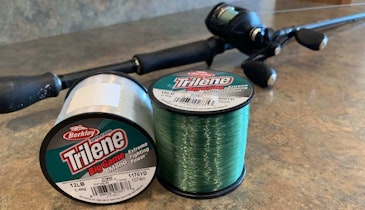DAVID A. LIEB | Associated Press
JEFFERSON CITY, Mo. -- Judges on the Missouri Supreme Court appeared skeptical Tuesday as an attorney for a convicted drug dealer argued that a new state constitutional amendment should allow nonviolent felons to carry guns.
The judges are considering how to interpret an amendment approved by voters in August that enhanced the state's existing right to keep and bear arms. The measure makes gun-control restrictions subject to strict legal scrutiny, but adds that it shouldn't be construed to prevent laws limiting the gun rights of "convicted violent felons."
The measure doesn't address the gun rights of nonviolent felons, such as Marcus Merritt, who was convicted of a federal drug dealing felony in 1986 and charged in 2013 with additional drug crimes and violating Missouri's ban on felons possessing firearms. Merritt's attorney, public defender Matthew Huckeby, argued that Missouri has no compelling reason to ban all felons from possessing guns for life.
But judges repeatedly pressed Huckeby to try to explain why the new constitutional amendment should be broadly applied to invalidate firearm bans for nonviolent felonies.
Judge Laura Denvir Stith noted that states have long had constitutional provisions similar to the 2nd Amendment of the U.S. Constitution, which says the right of the people to keep and bear arms shall not be infringed.
"Courts have always found -- in all the states -- that that does not prohibit legislation from regulating the rights of felons to possess arms, even though it didn't specifically state in the section that's considered a permissible regulation," Stith said.
Stith later added: "You're asking for a total change in how courts have interpreted that language?"
Huckeby said Missouri's 2008 law against felons possessing firearms was unreasonable both before and after the adoption of the new constitutional amendment.
Judge Paul Wilson later honed in on Stith's point, asking Huckeby to cite to a specific word or phrase in the voter-approved amendment that would now invalidate Missouri's law barring felons from possessing firearms. Wilson said the measure's specific allowance for laws limiting guns-rights for violent felons doesn't necessarily mean that limits on other people aren't allowed.
Huckeby responded by highlighting the new requirement for "strict scrutiny," suggesting that means laws must be narrowly tailored when restricting gun rights. He said a ban on all felons carrying guns was not narrow and served no compelling government interest.
St. Louis Circuit Judge John Garvey Jr. dismissed the firearm possession charges against Merritt in July 2013, more than a year before the constitutional amendment was adopted. The judge didn't say exactly why he did so, but attorneys for both Merritt and the state urged the Supreme Court to weigh in on how to apply the new constitutional wording.
State Solicitor General James Layton said Missouri had 1,467 felon-firearm-possession charges pending in the court system as of September.
Layton told judges they didn't need to interpret the "strict scrutiny" wording to mean the government must show a compelling interest that is narrowly tailored in order to limit gun rights. But even if the court decides that laws limiting gun rights must be narrowed, Layton said that shouldn't entitle Merritt to own a gun because of his drug offenses.
Among those watching the hearings was state Sen. Kurt Schaefer, a Columbia Republican who sponsored the constitutional amendment and is running for attorney general. Schaefer said his intent was to match Missouri's constitutional provision with recent U.S. Supreme Court rulings on the 2nd Amendment. He said gun rights may be appropriate for some nonviolent felons, but not for those convicted of felonies such as drug crimes that "can be perpetuated or exacerbated by the use of a firearm."
Online: http://on.mo.gov/1vAsDjs
Follow David A. Lieb at: https://twitter.com/DavidALieb






